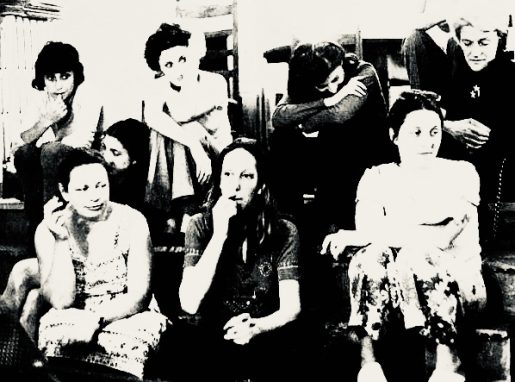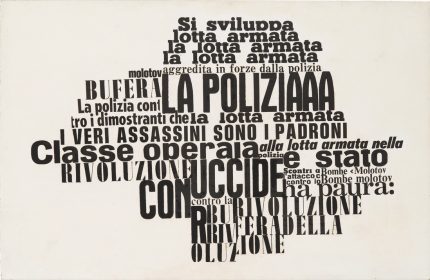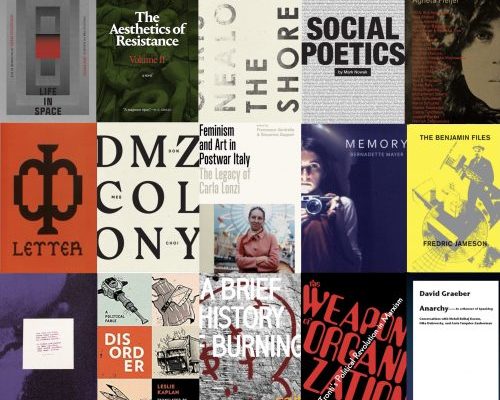Any attempt to give an account of the histories of feminism and art in Italy in the second half of the twentieth century inevitably stumbles upon the figure of Carla Lonzi (1931–1982), a renowned art critic throughout the 1960s, who would later become the most emblematic figure of Italian feminism. Lonzi’s intellectual and political trajectory is marked by her withdrawal from the art world in 1970, as she founded the radical feminist group Rivolta Femminile (Feminine Revolt) with Italian artist Carla Accardi and African-Italian journalist Elvira Banotti. Her feminism is therefore defined by a radical negativity, which expresses itself…
Tag: Carla Lonzi
dreaming of one thing [subversive chronicle]
i said endurance has its limits people are made of flesh and bone / i spoke about the stalinists and the method of executing the very best as traitors / who died screaming long live the party! / sifis said / the statement is only the beginning. then they will ask who are your friends. / then where do they live. katerina gogou i believe at heart that one must not be an accomplice to lies and compromise, the contemporary artist must scream out their revolt and make understood that we live in an unbearable, cruel, and…
riots and/or poetics [6/2022]
Nathalie Quintane | TOMATOES + Why doesn’t the far left read literature? (Kenning Editions) a poetic of montage + détournements. the piecing together of heterogeneous elements to arrive at new connections. to destabilise habits. to blur the boundaries of different genres. illuminating public discussions from remote, radical angles. the attention to new forms of coexistence. of social uprisings + a linguistic dissent. collective voices. the words + banners of political movements, the pamphlets. the minorities [who are constantly in the majority]. the restless revenants. an apparent continuity of uprisings. l’affair de tarnac, la ‘jungle’ de calais + notre-dame-des-landes. instead…
[ACTION #4] MASSLESS COUNTERPOETICS
“I’m in no hurry, I’m not choking, I’m not destroyed, I’m not buried, I’m not surrounded, I’m not destroyed, I’m breathing.” [Christophe Tarkos] May-June 1886. La Vogue magazine publishes Rimbaud’s Les Illuminations. The poem “Démocratie” [written after the suppression of the Paris Commune] details the stifling colonialism, the unreasonable demands of capitalist conditions [the ice-cold laws of traders], & the slaughter of the revolts that logically follow. June 1872. In The Communist Manifesto, Marx & Engels report on how the Pope, the French right [including the neoliberals] & the German police are all busy hunting down the “spectre of…
Carla Lonzi’s Self-Portrait | A conversation with Allison Grimaldi Donahue & Teresa Kittler
In 1969, the Italian art critic and feminist Carla Lonzi (1931-1982) authored Autoritratto (Self-Portrait) using the transcripts of interviews conducted with fourteen prominent artists living in Italy: Carla Accardi, Getulio Alviani, Enrico Castellani, Pietro Consagra, Luciano Fabro, Lucio Fontana, Jannis Kounellis, Mario Nigro, Giulio Paolini, Pino Pascali, Mimmo Rotella, Salvatore Scarpitta, Giulio Turcato and Cy Twombly. Overlooked for many years, Autoritratto’sexperimental unravelling of traditional art criticism has garnered increasing attention since its republication by Et al./Edizioni in 2010. It was, however, Lonzi’s final work as an art critic; after its publication she renounced the art world, co-founded the collective Rivolta femminileand wrote a…
Claire Fontaine | 1977:The Year That Is Never Commemorated
“It’s not enough to denounce the lies of the power, we need to denounce and break also the truths of the power. When the power tells the truth and it pretends that it’s something natural, we must denounce what is inhuman and absurd in this order of reality, which is reproduced, reflected and consolidated by the order of speech. We must unveil the delirious aspect of the power. Let’s pretend to be in the place of the power, let’s speak with its voice, let’s emit signals as if we were the power with its tone of voice. But…
riots and/or poetics [1/2021]
A Reading List Galina Rymbu | Life in Space (Ugly Duckling Presse). Can poetry be a revolutionary practice? Under what conditions can poetry trigger change? In All The King’s Men, Guy Debord states: “The point is not to put poetry at the service of revolution, but to put revolution at the service of poetry.” As a political activist, Rymbu participated in the 2011-12 protests for fair elections during her time at the Moscow Gorky Literature Institute. The street is still the place where the anti-capitalist fights, the struggles for a better life take place. The poems of the cycle White…
Best Books of 2020
Galina Rymbu | Life in Space (Translated by Joan Brooks) To be political, poetry does not have to turn into advertising, advocate for parties or platforms. Poetry becomes political when it represents the world as having a nature that is not “natural,” but rather negotiated, an Indra’s net that is political, social, and economic; made up of contingencies, and having to do with power—mainly of people over people—which is buttressed by ideology first and coercion second. A poetry that represents the world as political is political. It is also secular. A poetry that represents the world as immutable is…
Carla Lonzi | Let’s Spit on Hegel
The feminine problem is the relationship of any woman – deprived as she is of power, of history, of culture, of a role of her own – to any man: his power, his history, his culture, his absolute role. This problem calls into question the whole of man’s work and thought; man who has had no awareness of woman as a human being on the same level as himself. In the eighteenth century we demanded equality, and Olympe de Gouges went to the scaffold for her Declaration of the Rights of Women. The demand for equality of women with…
riots and/or poetics [5/2020]
the high degree of social danger inherent in the choice of implements and the method of execution / expropriations and searches proletarian fires and corruption of the public good kidnappings and sequestering of persons beatings wounds / sufficient evidence of guilt can be inferred from the laws as formulated in the index books / carried out in houses and adjacent rooms in the middle of the night / 1) the copious documentation seized or acquired above all those parts that celebrate and program the violence and the armed struggle / the final goal being the general overthrow of the existing…
Carla Lonzi (Part One)
Karolin Meunier ON VAI PURE BY CARLA LONZI READING SESSION 1 AND 2. EDIT 2 How to introduce a book that I hardly know, written in a language that I do not speak? The following text is the product of two translation sessions, one with Paolo Caffoni and one with Federica Bueti, as we started to read Vai Pure (Now You Can Go), a conversation between the Italian feminist, writer, and art historian Carla Lonzi and her partner Pietro Consagra, conducted in Lonzi’s apartment in Rome 1980 before they broke up their relationship. Lonzi had used this method—that is…
Carla Lonzi (Part Two)
FINDING RESONANCES WITH CARLA LONZI Giovanna Zapperi with Federica Bueti I am not quite sure when or how I came across Carla Lonzi’s writing. It happened in the casual manner in which sometimes one’s life changes in unexpected ways. Lonzi’s writing did not change my life, but it offered me an opportunity to reflect upon it. Lonzi’s feminist practice is a work of unearthing, undoing, and undressing that shakes up the foundation of our culture and beings. What has society made of me? Who am I? Lonzi ceaselessly questions her sense of self, the place society had assigned to…












